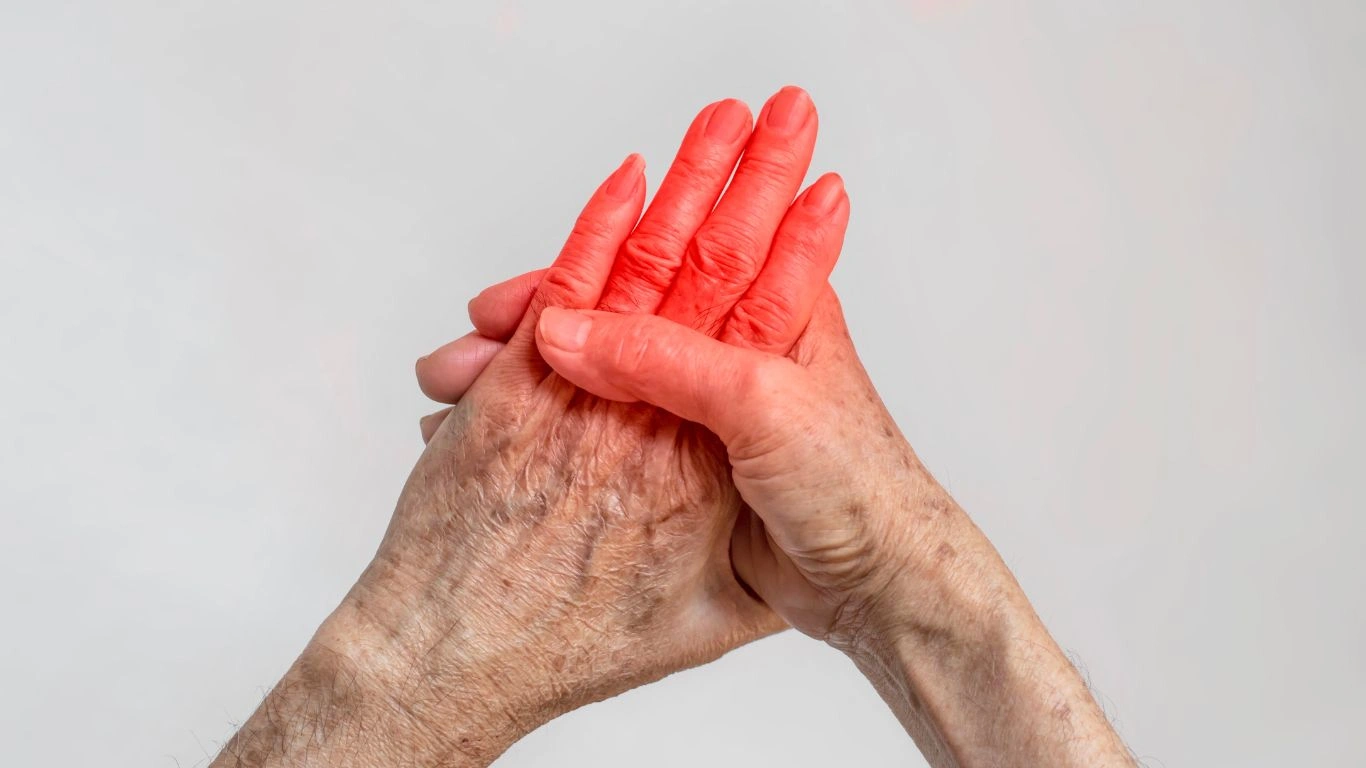7 Proven Rheumatoid Arthritis Weight Loss Strategies for Long-Term Success
Rheumatoid arthritis (RA) can be a real challenge, especially when it comes to managing weight. As a Rheumatology Nurse Practitioner, I’ve seen firsthand how patients with RA often struggle with weight gain or loss due to inflammation, joint pain, and the impact of medications. It’s not uncommon for patients to feel frustrated when trying to manage their weight while also dealing with the complexities of RA. But, with the right strategies, weight loss can become a more manageable aspect of life with rheumatoid arthritis. In this article, we’ll dive into the important weight loss strategies for rheumatoid arthritis, focusing on practical tips that can improve your health and well-being.
Understanding the Connection Between Rheumatoid Arthritis and Weight

When you’re living with rheumatoid arthritis, it’s easy to focus on joint pain and inflammation, but there’s another aspect that can often be overlooked: how RA affects your weight. For many people with rheumatoid arthritis, weight loss or weight management can become a daunting challenge. RA is an autoimmune disease where the immune system mistakenly attacks the joints, causing inflammation, stiffness, and pain. But it doesn’t stop there—this inflammation can also affect other aspects of the body, including metabolism.
For some people with RA, the inflammation in their body can lead to unintended weight loss. This can occur because the body’s energy demands increase due to the inflammation. Additionally, the pain and stiffness associated with RA might make it difficult to maintain an active lifestyle or prepare healthy meals, which can further contribute to unintentional weight loss.
On the other hand, medications commonly used to treat RA, such as corticosteroids, can cause weight gain. Corticosteroids can lead to an increase in appetite, fluid retention, and changes in fat distribution. This can make managing your weight even more challenging while trying to stay on top of your rheumatoid arthritis treatment plan. It’s not uncommon to feel like your body is working against you, but don’t worry—you’re not alone, and there are steps you can take to better manage your weight while living with RA.
Weight Loss Strategies That Work for RA
1. Prioritize Anti-Inflammatory Foods
One of the first strategies I recommend to patients dealing with rheumatoid arthritis and weight loss is focusing on anti-inflammatory foods. Inflammation plays a huge role in RA, so by incorporating foods that reduce inflammation, you can help minimize the impact of RA on your body and potentially assist with weight management.
- Omega-3 fatty acids: Foods like fatty fish (salmon, mackerel), flaxseeds, and chia seeds are rich in omega-3 fatty acids, which have anti-inflammatory properties.
- Fruits and vegetables: Colorful produce like berries, spinach, kale, and broccoli are packed with antioxidants and nutrients that fight inflammation.
- Whole grains: Brown rice, quinoa, and whole wheat are high in fiber, which supports digestion and overall health.
- Nuts and seeds: Almonds, walnuts, and sunflower seeds are great for their healthy fats and ability to curb hunger, making them a smart snack choice.
Incorporating these anti-inflammatory foods into your diet can not only help manage RA symptoms but also support your weight loss goals. By choosing nutrient-dense foods, you’re fueling your body with what it needs to reduce inflammation while keeping your metabolism running smoothly. Plus, these foods tend to be lower in calories, which can help you stay within your weight loss target.
2. Stay Active Within Your Limits

Maintaining physical activity when you have RA might seem impossible at times due to joint pain, fatigue, or limited mobility. However, even small amounts of activity can be incredibly beneficial for both managing RA and aiding in weight loss. I often tell my patients that movement doesn’t have to mean intense workouts—it can be as simple as gentle stretching, walking, or swimming.
One of the best exercises for RA patients is low-impact activities, like swimming or water aerobics, which provide a full-body workout without stressing the joints. Yoga and tai chi are also great options as they focus on flexibility, balance, and gentle strengthening. I encourage my patients to aim for 30 minutes of light to moderate exercise most days of the week, but even starting with 10–15 minutes a few times a week can lead to improvements over time.
Exercise helps maintain muscle mass, which is crucial for boosting metabolism and burning fat. It also promotes better joint health by increasing circulation and improving range of motion. Plus, exercise helps combat the fatigue often associated with RA, so you may feel more energized and motivated to stick with your weight loss plan.
3. Manage Stress to Avoid Emotional Eating
Stress is something that many people with RA deal with daily—whether it’s from the constant pain, the unpredictability of flare-ups, or the frustration of managing a chronic illness. Unfortunately, stress can also lead to emotional eating, which can sabotage your weight loss efforts.
I’ve seen it time and again: stress levels rise, and suddenly, food becomes a comfort or coping mechanism. If this sounds familiar, you’re not alone. One of the best ways to avoid emotional eating is by managing stress through relaxation techniques, such as deep breathing, mindfulness, or meditation.
- Mindfulness meditation: Spending just a few minutes a day focusing on your breath can help lower cortisol levels, which are linked to stress and fat storage.
- Journaling: Writing down your thoughts can help you process emotions without turning to food for comfort.
- Physical activity: As mentioned earlier, gentle exercises like yoga can reduce stress and promote a sense of well-being.
By addressing stress head-on, you’ll not only improve your emotional health but also help prevent emotional eating, which can lead to unwanted weight gain.
Taking the Next Steps

Managing rheumatoid arthritis and weight loss may seem overwhelming, but taking small, consistent steps can make a huge difference. Focus on anti-inflammatory foods, stay active within your limits, and manage stress to avoid emotional eating. These strategies are all about setting yourself up for success without overwhelming your body. Remember, every journey is unique, and what works for one person might not work for another. Be kind to yourself along the way, and don’t hesitate to seek professional advice from your healthcare provider or a nutritionist who can help tailor your weight loss plan to your specific needs.
How Medications Affect Weight Loss and Management with RA

As anyone living with rheumatoid arthritis knows, managing your treatment plan is a huge part of dealing with the disease. But did you know that some of the medications you take to manage your RA can also impact your weight? It’s something I see all the time in my practice, and it’s essential to understand the effect that medications can have on your weight loss journey.
Common medications for RA include nonsteroidal anti-inflammatory drugs (NSAIDs), disease-modifying antirheumatic drugs (DMARDs), and biologics. While these drugs can help reduce inflammation, pain, and disease progression, they can also have side effects that affect your metabolism or appetite. Corticosteroids, for example, are widely used in RA treatment but can lead to weight gain due to increased appetite, fluid retention, and fat redistribution.
If you’re finding it difficult to lose weight while on corticosteroids or other RA medications, it might be worth discussing alternative options with your healthcare provider. They may be able to adjust your treatment plan or suggest medications that have less impact on weight. It’s also helpful to keep track of any weight changes and share that information with your healthcare team so they can better guide your treatment choices.
1. Corticosteroids and Weight Gain
Corticosteroids, such as prednisone, are commonly prescribed for their ability to control inflammation and reduce flare-ups. However, these drugs are notorious for causing weight gain. This happens for a few reasons: corticosteroids increase your appetite, cause fluid retention, and can lead to an increase in fat storage, particularly around the abdominal area.
If you’re on corticosteroids and trying to manage your weight, there are a few strategies that might help mitigate the effects:
- Stay hydrated: Drink plenty of water to help reduce fluid retention and support your metabolism.
- Opt for smaller meals: Eating smaller, more frequent meals throughout the day can help control hunger and prevent overeating.
- Monitor salt intake: Excessive sodium can worsen fluid retention, so try to limit processed foods and high-sodium snacks.
While these tips may not fully offset the weight gain caused by corticosteroids, they can help you regain control and make weight management more achievable.
2. Biologics and Their Impact on Weight
Biologics, like Humira and Enbrel, are another class of medications used to treat RA by targeting specific parts of the immune system. Biologics tend to have a more focused mechanism of action compared to traditional DMARDs, which means they are often more effective in managing inflammation. However, their effect on weight can vary from person to person.
Some people report weight loss while on biologics, potentially due to reduced inflammation and improved mobility, allowing them to exercise more. Others, however, might experience weight gain as a side effect. If you’re seeing changes in your weight after starting biologic therapy, it’s important to communicate this with your healthcare provider so they can monitor your progress and help you adjust your approach if necessary.
Developing Healthy Lifestyle Habits to Support Weight Loss

When living with RA, it’s easy to fall into the trap of thinking that weight loss is out of your control. The reality, however, is that you can implement some lifestyle changes to make a significant impact on your weight. These changes don’t need to be drastic or overwhelming—small, sustainable adjustments can lead to long-term success. Here are some of my personal recommendations for building healthy habits that can support weight loss with RA.
1. Focus on Whole Foods
As we’ve already discussed, anti-inflammatory foods are key in managing RA. But let’s take it a step further by focusing on whole, unprocessed foods that nourish your body without causing excess weight gain. Whole foods are typically lower in calories and higher in nutrients, which means they can support both your weight loss goals and your RA treatment.
Think fresh fruits, vegetables, lean proteins like chicken and tofu, and whole grains like quinoa or brown rice. These foods provide the vitamins, minerals, and fiber that you need to stay healthy and energized without packing on extra calories. Plus, they’re easier on your digestive system and can help combat some of the issues that come with inflammation.
If you find meal planning and prep to be a challenge, I recommend starting small. Begin by planning one or two meals each week that focus on whole foods, then gradually build up from there. Trust me, once you get into the habit, it will feel second nature!
2. Get Support from Your Healthcare Team
Weight loss with rheumatoid arthritis can feel like a solo journey, but it doesn’t have to be. You don’t have to manage everything on your own—your healthcare team is there to help you. As a nurse practitioner, I often see the power of collaboration between patients and their doctors, dietitians, and physical therapists.
If you’re struggling to lose weight or manage RA, don’t hesitate to reach out for additional support. A registered dietitian can help you design a meal plan that’s specific to your needs, while a physical therapist can recommend exercises that protect your joints and help you build strength. Working together, you can create a comprehensive plan that not only addresses your weight loss goals but also supports your overall health and well-being.
3. Build a Support System
Living with a chronic condition like RA can feel isolating at times, but building a support system can make all the difference. Whether it’s family, friends, or online communities, having people who understand what you’re going through can provide the encouragement you need to keep pushing forward. Sometimes, just knowing that others are rooting for you can make the journey feel less daunting.
Consider joining a local or online RA support group, where you can share experiences and weight loss strategies with others who understand what it’s like to live with RA. Social support is linked to better health outcomes, so don’t be afraid to lean on others when you need it.
Making Sustainable Changes for Long-Term Success
As you begin to make changes to your diet, exercise routine, and overall lifestyle, it’s important to remember that sustainability is key. Fad diets and extreme workouts may seem appealing, but they’re often not sustainable in the long run, especially for those with rheumatoid arthritis. Instead, focus on making gradual, lasting changes that you can maintain over time.
Start small—whether that’s adding an extra serving of vegetables to your meals, committing to a 10-minute walk each day, or reducing your intake of processed foods. The goal is to create a healthy, balanced lifestyle that works for you and your RA, not something that adds stress or frustration to your life. Progress might be slow, but it’s important to celebrate every win along the way. After all, any improvement in managing your weight and RA symptoms is worth celebrating!
Staying Motivated: How to Keep Going When Things Get Tough

Let’s face it—managing weight loss while living with rheumatoid arthritis can feel like an uphill battle, especially when flare-ups hit or the pain just won’t quit. As a Rheumatology Nurse Practitioner, I’ve seen how discouraging this can be for patients. The road to weight loss can seem long, and progress may feel slow, but I promise you, every small step counts. Staying motivated during the ups and downs is a huge part of the process. You’re not alone in this journey, and there are plenty of strategies to help keep your spirits high as you work toward your health and weight loss goals.
1. Set Realistic Goals
One of the best pieces of advice I can give is to start by setting realistic, achievable goals. It’s easy to feel overwhelmed if you set a goal that feels too big or impossible to reach, especially when you’re already managing the challenges of RA. Instead, focus on smaller milestones that you can track and celebrate. Maybe it’s adding more vegetables to your meals, doing a gentle 10-minute stretch every day, or losing a couple of pounds over the course of a month.
By setting small, attainable goals, you’re more likely to see progress that keeps you motivated. These smaller wins can add up over time, and as you achieve each one, you’ll build momentum to continue moving forward. Just remember, the journey to weight loss is not a sprint—it’s more of a marathon. It’s about building habits that stick, not trying to rush the process.
2. Embrace the Power of Support
Support is such a game-changer when it comes to sticking with your weight loss plan. Whether it’s a family member, a friend, or a support group, having someone to cheer you on can make all the difference. If you’re feeling stuck, having someone to talk to can help you stay motivated and remind you why you started in the first place. I’ve had patients tell me how much of a difference it made when they joined an online RA support group where they could connect with others going through the same thing.
In addition to emotional support, having a workout buddy can also help you stay on track. Even if you’re just taking a short walk together or doing a gentle yoga class, it’s easier to stick to a routine when you have someone by your side. Plus, it makes the process a lot more fun!
Dealing with Setbacks: How to Stay Positive

No matter how well you plan or how many healthy habits you incorporate into your routine, setbacks are inevitable. And when you’re living with rheumatoid arthritis, those setbacks can feel especially frustrating. Maybe a flare-up of RA symptoms slows you down, or maybe you hit a weight loss plateau. Trust me, I’ve seen it all, and it’s completely normal to face challenges along the way. The important thing is how you respond to those setbacks.
Instead of feeling defeated, I encourage you to view setbacks as an opportunity to reassess and adjust. If pain or fatigue is making exercise difficult, try swapping your routine for something gentler—like stretching, swimming, or a yoga class. If you find yourself slipping into unhealthy eating habits, don’t beat yourself up. Simply get back to your anti-inflammatory foods, drink plenty of water, and refocus on your goals. Remember, it’s okay to have bad days. What matters is getting back on track the next day.
1. Focus on the Bigger Picture
When things don’t go according to plan, it’s easy to lose sight of your overall progress. But I always remind my patients that managing rheumatoid arthritis and maintaining a healthy weight is a long-term journey, not a quick fix. Every healthy meal, every bit of exercise, and every moment of self-care counts. Even if you don’t see immediate results, know that you’re investing in your future health. Be patient with yourself, and trust the process.
2. Learn from Each Setback
Setbacks can be frustrating, but they also offer valuable lessons. If you experience a flare-up or difficulty sticking to your weight loss plan, take a step back and analyze what might have contributed to it. Is there a particular food or medication that could be causing weight gain? Did you push yourself too hard with exercise, or was your stress level higher than usual? Identifying the root cause of a setback allows you to take proactive steps to avoid it in the future.
Additional Resources for Managing RA and Weight Loss
There’s a wealth of information and resources available to help you navigate the intersection of rheumatoid arthritis and weight loss. Whether you’re looking for more meal ideas, exercise tips, or just need support, there are plenty of helpful websites and organizations out there that can offer guidance. I recommend checking out reputable resources like Health.com, NIH, and Arthritis Foundation for additional articles, support groups, and expert advice.
Another great resource is a consultation with a registered dietitian who can provide personalized advice tailored to your specific needs. They can help create a meal plan that supports your weight loss goals while being mindful of your RA symptoms. Pairing this with advice from your doctor or rheumatologist can ensure that you’re on the right track both with your treatment and your weight loss plan.
Disclaimer
The information provided in this article is intended for educational purposes only and should not be construed as medical advice. Always consult with your healthcare provider before making changes to your diet, exercise routine, or medication regimen. Each individual’s experience with rheumatoid arthritis and weight loss may vary, and it’s essential to tailor any advice to your specific circumstances and health conditions. The content in this article is based on the author’s experience as a Rheumatology Nurse Practitioner and current best practices, but individual results may differ.

Tarra Nugroho is a dedicated Nurse Practitioner with a strong foundation in family and preventive care. She brings both compassion and clinical expertise to her practice, focusing on patient-centered care and health education. As a contributor to Healthusias.com, Tarra translates medical knowledge into clear, empowering articles on topics like women’s health, chronic disease management, and lifestyle medicine. Her mission is simple: help people feel seen, heard, and informed—both in the clinic and through the content she creates. When she’s not caring for patients, Tarra enjoys weekend hikes, plant-based cooking, and curling up with a good health podcast.







